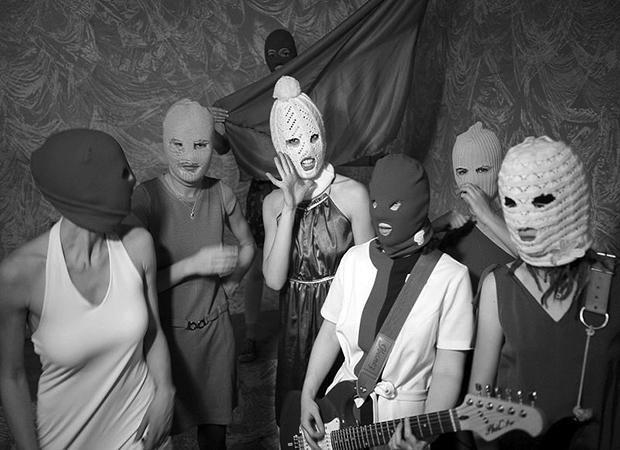Videos of the now-infamous Russian feminist band Pussy Riot’s performance at Moscow’s Cathedral of Christ in February show three women wearing colorful balaclavas and dresses, jumping around stage, and screaming lyrics that have been heard around the world.
The 1-1/2 minute “punk prayer” has garnered attention from the likes of Madonna and Paul McCartney. Protests throughout the Western world show supporters wearing colorful balaclavas, holding signs urging the Russian government to “Free Pussy Riot.” It’s a catchy phrase that sums up the band itself, with nods to the rebellious punk of the 1970s, the riot grrrl of the 1990s, and a reclaiming of the female body.
Two of the three women – now identified as Maria Alyokhina, Yekaterina Samutsevich, and Nadezhda Tolokonnikova – have been sentenced to two years in prison for “hooliganism” motivated by religious hatred. Samutsevich was released Oct. 10 after an appeals court suspended her sentence.
Their performance in the Moscow church included lyrics like “don’t upset His Saintship, ladies/stick to making love and babies” and urging the Virgin Mary to “be a feminist, we pray thee” and to “put Putin away, put Putin away.”
Marina Syrova, the judge who convicted the women in August, described them as having committed crimes including “the insult and humiliation of the Christian faith and inciting religious hatred.”
While it’s debatable whether or not the performance would draw attention in the United States, the music carried a sense of urgency, danger, and political change that has been long absent from the music scene in democratic countries.
Canada Choate (’13) says that while the women’s sentence is not proportional to their crime, “either way they’ve won.”
“Even if they’re going to be in jail for two years, they’ve reached a huge audience,” said Choate. She believes that the performance “wasn’t disrespectful but a productive and modern way to use religion.”
Mabel Taylor (’14) was frustrated by the sentence, saying that “what the (Russian government) labeled the crimes was harsh.”
Indeed, the two-year sentence has been much contested by Westerners. Catherine Ashton, high representative for the European Union, was quoted as saying she was disappointed by the verdict.
“It puts a serious question mark over Russia’s respect for international obligations of fair, transparent, and independent legal process,” Ashton said in a statement released in Brussels on Aug. 17.
On the same day, a spokeswoman for the State Department told reporters that the U.S. “urges Russian authorities to review this case and ensure that the right to freedom of expression is upheld.”
As of print time, the group’s appeal has been postponed until Oct. 10 due to one of the defendants firing her lawyer.
Elizabeth Johnson (’15), a member of SWEAR, sums up her feelings about the case: “being half Russian, I am extremely ashamed of my country when I see what horrible and outrageous things the government is doing. It seems like Russia is taking a huge step back again, and it hurts me to see that happening.”
For more information, including rally locations, head to freepussyriot.org.


